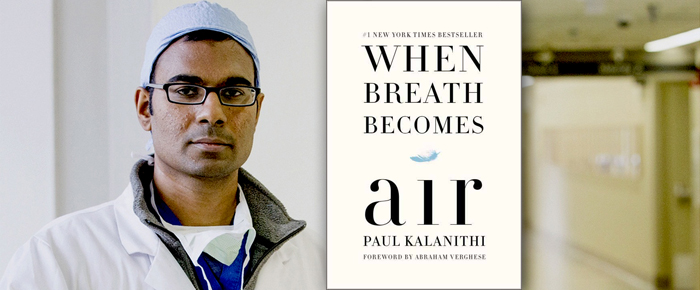
By Heidi Simmons
—–
When Breath Becomes Air
by Paul Kalanithi
Memoir
—–
Death is often difficult to talk about and it feels especially strange to consider one’s own passing. Yet, death is a reality we all face. In Paul Kalanithi’s When Breath Becomes Air (Random House, 238 pages) a neurologist shares his life — and death.
Author Kalanithi had his life all planned, but as the saying goes, “The best laid plans of mice and men often go awry.”
Kalanithi was 10 years old when his father moved the family from New York City to Kingman, Arizona. There, his father became a beloved cardiologist. But his mother, a physiologist, feared her three sons’ education would lack in the small town and created a challenging literary curriculum. Young Kalanithi read everything his mother put forth. He enjoyed his new desert home and the freedom to roam.
With his great love of reading, Kalanithi developed a deep appreciation for human behavior and what it meant to be human. He was fascinated by story that dealt with the meaning of life.
Kalanithi graduated from Stanford University with a BA and an MA in English Literature. His love of literature was matched by his love of science. He struggled whether to be a scientist or an English professor. An advisor said that English professors reacted to science “like apes to fire with sure terror.”
Continuing his education, Kalanithi earned a BA in human biology at Stanford and then applied to medical school. While waiting to be accepted, he earned an MPhil in history and philosophy of science and medicine from the University of Cambridge. Kalanithi was accepted to Yale’s medical school where he pursued neuroscience. He also met his wife, Lucy.
Back at Stanford, Kalanithi was a medical resident working 100 hours a week. He learned first hand the significance and effect of death on humans and the ones they loved. He realized that patients needed a narrative to understand their dire medical situation. As a surgeon, he too needed to understand the patient’s story to better serve their medical dilemma. Every day was about life and death.
While a resident, Kalanithi became a top neurosurgeon and scientist. He was to be the next professor in Stanford’s neurology department that promised prestige and big money. With all his hard work, he ignored the persistent pain in his back and chest and other symptoms he feared might be serious. He said nothing to his wife. But when his wife threatened to leave him, he shared that he may be very ill.
Indeed he was. At 34, Kalanithi had stage four lung cancer — a prognosis he knew was grim. Depending on the treatment, and his body’s response, he had maybe two or three years of life remaining.
Kalanithi wrote about his life and experiences as he processed his approaching death. He and his wife decided to have a baby and he was committed to finishing his residency — if he could. All the future plans he worked so hard to achieve, a life that would soon be everything he ever wanted, was now off the table.
When Breath Becomes Air is a moving story about how precious life is and how our relationships with our fellow humans, friends and family make life meaningful. Kalanithi’s baby girl was nine months old when he died.
Kalanithi writes beautifully and expresses himself with grace, clarity and dignity. As a doctor, he gives the reader insight into the medical decisions involved with saving lives. He shares just how difficult it is to achieve perfection as a surgeon, but it is a doctor’s duty to strive for it. Kalanithi exemplifies how necessary it is for medical professionals to connect with patients and their personal stories.
This is a powerful book about life and death. Kalanithi’s wife, Lucy, finishes the book and describes her husband’s final days. I found myself caught up like a friend in his hospital room saddened and tearful when Kalanithi passed away. I felt the loss to his family, the world he loved and wanted to change for the better. A great mind and talented doctor gone. It’s painful.
But, I appreciated Kalanithi’s effort to help readers better understand death juxtaposed with life. He uses literary references and quotes throughout the book revealing how, over centuries, writers have tried to better define and grasp what it means to exist. There are no simple answers. Death cannot be separated from life.
Like Kafka said, “The meaning of life is that it ends.”











































